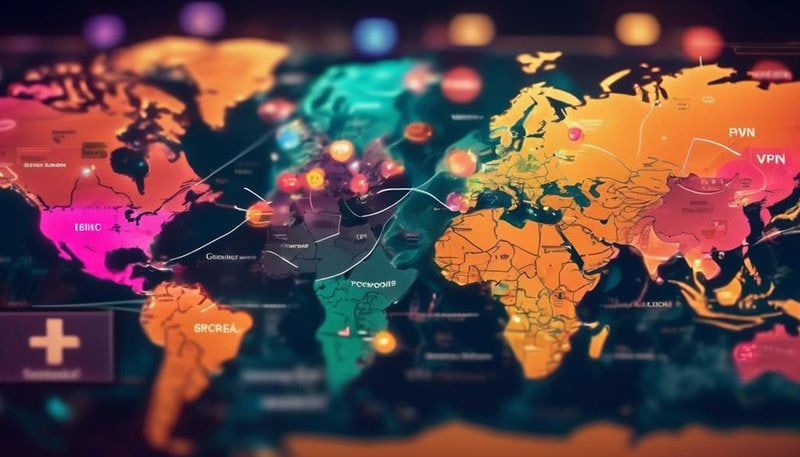How to Choose a VPN Based on Server Locations

Server locations are important when choosing a VPN because they determine the performance and effectiveness of the VPN. They also impact the ability to access content from different geographic locations.
Key Takeaways
- Server locations play a crucial role in determining the performance and effectiveness of a VPN.
- Closer server locations result in faster connection speeds, while different countries can protect your anonymity.
- The server network coverage and distribution across countries are important factors to consider for bypassing geo-restrictions and accessing content.
- Specialized servers and features, along with strong server security and privacy measures, are essential considerations when choosing a VPN based on server locations.
Understand the Importance of Server Locations
Understanding the importance of server locations is crucial when choosing a VPN. Server location selection plays a significant role in determining the effectiveness and overall performance of a VPN service. The impact of server locations on your online experience can’t be underestimated.
When you connect to a VPN, your internet traffic is routed through the VPN server. The closer the server is to your physical location, the faster your connection speed will be. This is due to reduced latency and shorter data transmission distances. By choosing a VPN with servers located in close proximity to your physical location, you can enjoy faster browsing, streaming, and downloading speeds.
Server locations also affect your ability to access geo-restricted content. Different countries have different regulations and restrictions on internet content. By connecting to a VPN server in a specific country, you can bypass these restrictions and access content that might otherwise be unavailable in your location.
Furthermore, server locations can impact your privacy and security. When you connect to a VPN server in a different country, your online activities appear to originate from that location. This can help mask your true identity and protect your anonymity.
Consider Your Geographic Needs
To effectively choose a VPN based on server locations, it is important to consider your specific geographic needs. Different VPN providers offer servers in various countries around the world, and this can have a significant impact on your online experience. By understanding your geographic needs, you can select a VPN that allows you to bypass geographic restrictions and effectively bypass censorship.
| Country | Benefits | Considerations |
|---|---|---|
| United States | Access to popular streaming platforms, such as Netflix and Hulu. | Potential data privacy concerns due to surveillance laws. |
| Netherlands | Fast and reliable connections, ideal for gaming and torrenting. | May not provide access to certain geo-restricted content. |
| Singapore | High level of privacy and security, ideal for bypassing censorship. | Limited number of servers compared to other countries. |
| United Kingdom | Access to BBC iPlayer and other UK-based streaming services. | Subject to surveillance laws and data retention policies. |
| Germany | Strong data protection laws, ensuring privacy and security. | Limited access to certain streaming services due to copyright restrictions. |
Assess the VPN Provider’s Server Network
Now it’s time to assess the VPN provider’s server network.
This involves considering the server network coverage, which refers to the number and distribution of servers across different locations.
You should also evaluate the server location diversity, ensuring that the provider has servers in the regions you need.
Additionally, pay attention to server performance indicators, such as speed and latency, to ensure a smooth and reliable connection.
Server Network Coverage
Evaluate the VPN provider’s server network coverage to determine the extent of their global presence and potential for reliable connections. When assessing server network coverage, it’s essential to consider both server selection and server availability.
A VPN provider with a wide range of server locations allows you to bypass geo-restrictions and access content from around the world. Additionally, a diverse server network can distribute the load and ensure a faster and more stable connection.
Look for a VPN provider that offers servers in key regions like North America, Europe, Asia, and Australia. This will allow you to connect to servers closer to your physical location, reducing latency and improving overall performance.
Server Location Diversity
Assess the VPN provider’s server network to determine the diversity of server locations available.
When choosing a VPN, it’s crucial to consider server location selection and optimization. A diverse server network allows you to connect to servers in various countries and regions, offering you more options for bypassing geo-restrictions and accessing content from around the world.
By having a wide range of server locations at your disposal, you can enjoy a more unrestricted internet experience and enhance your online privacy.
Additionally, a VPN provider with server locations in multiple countries provides better server location optimization, ensuring that you can connect to the fastest and most reliable server for your needs.
Server Performance Indicators
To evaluate the server performance of a VPN provider, analyze the indicators within their server network.
One important indicator to consider is server selection. A VPN provider with a wide range of server locations allows for better connectivity options and increased flexibility. This ensures that you can easily switch between servers and choose the one that best suits your needs.
Another crucial indicator is server availability. A VPN provider with a large number of servers ensures that there are enough resources to handle the traffic and provide a smooth and reliable connection. It also reduces the chances of overcrowding and congestion, resulting in better overall performance.
Evaluate Server Distribution Across Different Countries
You can gain valuable insights into a VPN’s server distribution by examining the countries in which its servers are located. Evaluating server availability across different countries is crucial when choosing a VPN that meets your needs. A wide distribution of servers ensures that you have options for connecting to different regions, providing you with more flexibility and access to geo-restricted content.
When assessing server distribution, it’s also important to consider the number of servers in each country. A higher number of servers indicates better availability and reduces the chances of overcrowding and slow speeds. It allows for efficient load balancing and ensures a stable and reliable connection.
Comparing server speeds across different countries is another important aspect to consider. Some VPN providers offer faster speeds in certain locations, based on factors such as network infrastructure and server capacity. By evaluating server speeds in various countries, you can choose a VPN that delivers optimal performance for your specific requirements.
Determine Server Speed and Performance
Considering server speed and performance is crucial when selecting a VPN, as it directly impacts the quality and reliability of your connection. To ensure an efficient and smooth browsing experience, you need to determine server reliability and analyze server capacity.
Here are four key factors to consider:
- Latency: Low latency is essential for real-time applications like video streaming or online gaming. A VPN server with low latency ensures minimal delays and a better overall user experience.
- Bandwidth: A VPN with sufficient bandwidth allows for fast data transfer and ensures smooth streaming and downloading. Analyzing the server’s bandwidth capacity helps you choose a VPN that can handle your browsing needs without compromising speed.
- Server Load: Avoid overcrowded servers by checking their current load. Highly populated servers may suffer from slower speeds and decreased performance. Opt for VPN providers that offer server load information to find less congested servers.
- Server Locations: The geographical distance between you and the VPN server can impact speed. Choosing a VPN with servers located closer to your physical location can result in faster connections.
Look for Specialized Servers and Features
Specialized servers and features enhance the functionality and security of your VPN connection. When choosing a VPN, it’s important to consider the specialized server selection and unique server features offered by the provider.
Specialized servers are designed to meet specific needs, such as streaming, gaming, or torrenting. These servers are optimized to provide a seamless and fast experience for these activities. By selecting a specialized server for your desired use, you can enjoy better performance and avoid any potential limitations that might be imposed on regular servers.
In addition to specialized servers, it’s also important to look for unique server features that enhance your VPN experience. Some VPN providers offer features like double VPN, which encrypts your connection twice for added security. Others offer obfuscated servers that allow you to bypass censorship and access restricted content. These features provide an extra layer of protection and flexibility, ensuring that your online activities remain private and unrestricted.
Research Server Security and Privacy Policies
When choosing a VPN based on server locations, it’s crucial to research the server security and privacy policies.
Look for providers that have robust security measures and protocols in place to protect your data.
Ensure that the VPN service you choose has a clear and transparent privacy policy to safeguard your online activities.
Server Policies and Security
To ensure the highest level of server security and privacy, it’s crucial to thoroughly research and analyze the server security and privacy policies of potential VPN providers. Here are four key factors to consider when evaluating server policies and security:
- Server Encryption: Look for VPN providers that use strong encryption protocols, such as AES-256, to protect your data as it travels between servers. This ensures that your information remains confidential and secure.
- Server Logging: Check if the VPN provider keeps any logs of your online activities. Ideally, you want a VPN that has a strict no-logs policy, meaning they don’t store any information about your browsing history or connection details.
- Data Protection Measures: Investigate what additional measures the VPN provider takes to safeguard your data. This could include features like a kill switch, which cuts off your internet connection if the VPN connection drops, preventing any potential data leaks.
- Server Location: Consider the jurisdiction in which the VPN provider’s servers are located. Opt for providers that are based in countries with strong privacy laws and no mandatory data retention policies.
Privacy Measures and Protocols
Considering the importance of server security and privacy, it’s imperative to thoroughly examine the server security and privacy policies of potential VPN providers when researching privacy measures and protocols.
Privacy concerns are at the forefront of your mind, as you seek a VPN that will protect your online activities and data.
Look for VPNs that have strong encryption protocols in place to safeguard your information from unauthorized access. Encryption protocols like OpenVPN, IKEv2, and WireGuard are known for their robust security features. These protocols use advanced encryption algorithms to secure your data, making it virtually impossible for anyone to intercept or decipher.
Research Server Location
To ensure the security and privacy of your online activities, it’s crucial to thoroughly research the server locations of potential VPN providers and carefully review their server security and privacy policies. Here are four key steps to help you in your research:
- Identify the server locations: Look for VPN providers that offer servers in the countries or regions you need to access. Consider the proximity of the servers to your physical location for better connection speed.
- Evaluate server security measures: Research the encryption protocols and security features implemented by the VPN provider. Look for industry-standard protocols like OpenVPN and AES-256 encryption to ensure your data is protected.
- Review privacy policies: Analyze the VPN provider’s privacy policy to understand how they handle your personal information. Look for strict no-logs policies that ensure your online activities aren’t stored or tracked.
- Conduct data analysis: Seek independent audits or security assessments conducted on the VPN provider’s servers. This will help you gauge the level of transparency and reliability of their security measures.
Frequently Asked Questions
Can I Choose Specific Server Locations Within a Country When Using a Vpn?
Can you choose specific server locations within a country when using a VPN? Yes, you can optimize VPN speed by selecting a server near your physical location, which offers the benefits of faster connection and reduced latency.
How Does the Number of Servers in a VPN Provider’s Network Affect My Browsing Experience?
The number of servers in a VPN provider’s network impacts your browsing experience. It affects download/upload speeds and VPN connection stability. More servers mean faster speeds and better stability, enhancing your browsing freedom.
Are There Any Server Locations That Are Known to Have Better Performance for Streaming or Gaming?
Want a VPN with optimal streaming or gaming performance? Consider server locations. The speed and stability of your connection can be affected. Factors to consider include proximity, server capacity, and network congestion.
What Measures Does a VPN Provider Take to Ensure the Security and Privacy of Their Server Network?
To ensure the security and privacy of their server network, a VPN provider handles server maintenance and updates regularly. They use protocols and encryption methods to secure the network, protecting your data and ensuring your freedom online.
Are There Any Specialized Servers Available for Specific Activities Such as Torrenting or Accessing Restricted Content?
To ensure unrestricted access and optimized performance, look for VPN providers offering specialized servers for activities like torrenting and accessing restricted content. Additionally, using server locations close to your physical location can offer benefits like faster speeds and lower latency.








